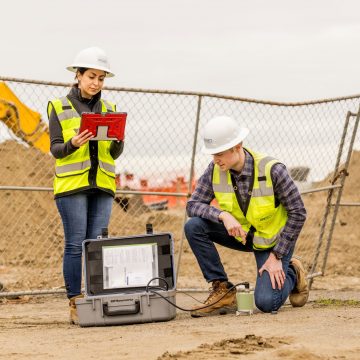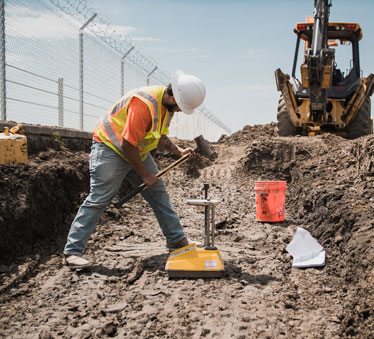The Impact of New Technologies on the Geotechnical Industry
The Impact of New Technologies on the Geotechnical Industry
Blog Article
A Detailed Introduction of the Key Obligations of Geotechnical Designers in Site Characterization and Ground Enhancement Strategies for Design Solutions
Geotechnical engineers are important to the effective execution of engineering jobs, entrusted with the vital duties of site characterization and the application of ground enhancement techniques. Their job entails a detailed evaluation of subsurface conditions, utilizing numerous screening methods to recognize dirt and rock buildings. This foundational understanding not just notifies style decisions but likewise minimizes possible threats associated with ground instability. As we explore the diverse functions of these experts, it ends up being obvious just how their knowledge shapes the security and efficiency of engineering services. What particular techniques and assessments stand apart in this vital discipline?
Function of Geotechnical Engineers
Geotechnical engineers play a critical function in the style and construction of infrastructure by assessing the actions of dirt and rock underneath the surface - geo tech engineering. Their responsibilities incorporate evaluating subsurface problems to notify design choices that guarantee structural security and safety. By performing comprehensive analyses of dirt properties, consisting of shear strength, leaks in the structure, and compressibility, geotechnical designers offer essential data that affects the selection of ideal building products and techniques
Along with evaluating dirt mechanics, geotechnical designers are tasked with determining possible risks such as landslides, sinkholes, and ground negotiations. Their knowledge aids reduce threats connected with these geotechnical phenomena, therefore safeguarding both the environment and public security. They additionally team up carefully with various other design self-controls, making certain that geotechnical considerations are integrated right into total job design.
Furthermore, geotechnical engineers engage in the analysis of existing frameworks, providing suggestions for retrofitting and repair services when necessary. Their extensive understanding of soil-structure interaction is crucial for the development of sustainable facilities options. Generally, the role of geotechnical engineers is essential to the successful awareness of construction tasks, ensuring they are safe, long lasting, and compliant with regulatory requirements.

Website Characterization Processes
Efficient site characterization procedures are vital for understanding the subsurface problems that influence task style and implementation. Geotechnical engineers employ a methodical approach to gather, examine, and translate data regarding groundwater, rock, and soil features. This process starts with a comprehensive evaluation of existing literary works and historic site information, offering understandings right into previous site conditions and potential obstacles.

Data evaluation complies with fieldwork, where engineers make use of geostatistical methods to interpret searchings for and develop geological models. Through attentive site characterization, geotechnical engineers lay the groundwork for effective task implementation, optimizing and lessening unexpected difficulties resource allotment.
Dirt and Rock Screening Techniques
While recognizing subsurface problems is crucial, the option of suitable soil and rock screening techniques is just as important for precise analysis and design. Geotechnical engineers use a variety of testing techniques to examine the physical and mechanical buildings of dirt and rock products.
Laboratory tests, such as Atterberg restrictions, grain size analysis, and unconfined compressive stamina examinations, offer vital data on soil actions under various dampness problems and packing situations. These tests assist figure out soil classification and predict negotiation or shear toughness features this essential for structure layout.
In-situ screening techniques, including Requirement Penetration Tests (SPT), Cone Penetration Tests (CPT), and pressure meter tests, permit engineers to collect information straight from the ground. These techniques use important insights right into the soil's density, uniformity, and stratification without the requirement for comprehensive sampling.
Rock screening commonly entails core sampling and laboratory analysis to assess properties like uniaxial compressive strength and rock quality classification (RQD) With each other, these dirt and rock testing techniques allow geotechnical designers to make educated decisions regarding site-specific obstacles, making certain the safety and security and stability of engineering solutions.
Ground Improvement Strategies
Ground enhancement techniques are essential for enhancing the engineering residential properties of dirt, therefore enhancing its load-bearing ability and reducing settlement. These methods are essential in attending to difficulties provided by troublesome or weak dirts, which can substantially impact the security and longevity of structures.
Numerous ground improvement techniques are employed, including compaction, grouting, and soil stabilization. Grouting, on the other hand, includes injecting a liquid product right into the ground to load voids and improve dirt communication.
Dirt stablizing encompasses a variety of methods, from chemical ingredients to mechanical treatments, focused on boosting the dirt's resistance to erosion and deformation. Techniques such as lime stablizing or cement blending modify the buildings of the dirt at a fragment degree, boosting geotech engineer its general performance.
Value of Geotechnical Evaluations
Geotechnical evaluations play a vital function in the planning and layout of design jobs, as they offer important details concerning the subsurface problems. Understanding soil homes, rock formations, groundwater levels, and possible geohazards is crucial for guaranteeing the security and security of frameworks. These evaluations enable designers to make educated decisions regarding site selection, style parameters, and building approaches.
The importance of geotechnical evaluations extends beyond first project stages; they are important in threat management and expense efficiency. By determining possible issues early, such as dirt negotiation, slope instability, or extreme groundwater, designers can develop proper mitigation methods, reducing the probability of structural failures and costly delays. These analyses sustain compliance with regulatory demands and enhance the sustainability of design techniques.

Final Thought
In conclusion, geotechnical designers are important to making certain the security and security of engineering jobs through detailed site characterization and ground enhancement techniques. geo tech engineering. Their systematic approach to evaluating subsurface problems, incorporated with their suggestions for effective ground adjustment, substantially enhances soil properties and load-bearing capability. The expertise of geotechnical engineers not only assists in informed project preparation but likewise makes certain compliance with guidelines and fosters efficient interaction amongst stakeholders, inevitably adding to effective design outcomes
Geotechnical engineers play a crucial duty in the style and building and construction of infrastructure by evaluating the habits of soil and rock under the surface area. By conducting detailed analyses of soil residential or commercial properties, including shear permeability, strength, and compressibility, geotechnical engineers give essential information that influences the choice of ideal building and construction products and methods.
In enhancement to evaluating soil auto mechanics, geotechnical engineers are tasked with recognizing potential threats such as landslides, sinkholes, and ground negotiations. Geotechnical designers use a systematic approach to gather, this article review, and analyze data pertaining to soil, rock, and groundwater attributes. By identifying possible issues early, such as soil negotiation, slope instability, or excessive groundwater, engineers can devise suitable mitigation techniques, reducing the possibility of expensive hold-ups and structural failures.
Report this page